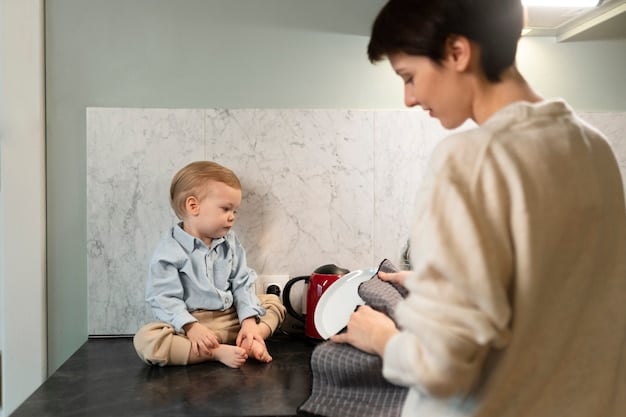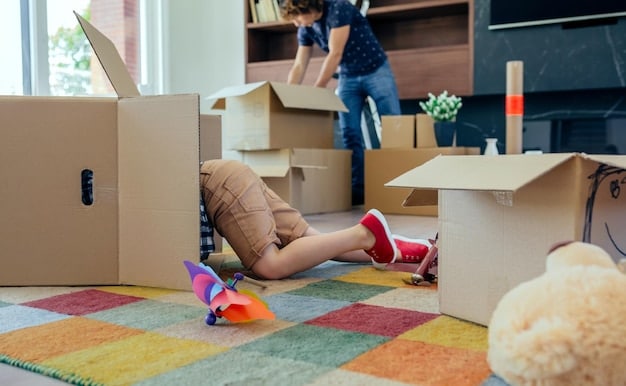Potty Training Regression: Expert Tips to Reclaim Success in 7 Days

Potty training regression can be frustrating, but with the right strategies, including patience, positive reinforcement, and consistent routines, you can address the underlying causes and help your child get back on track within 7 days.
Is your toddler, who was once a potty-training champ, suddenly having accidents again? Potty training regression is a common setback, but don’t worry! It’s often temporary and manageable with the right approach. Let’s explore expert tips for a successful turnaround in just 7 days.
Understanding Potty Training Regression
Potty training regression occurs when a child who has been successfully using the toilet starts having accidents again. Understanding the causes and recognizing the signs are the first steps in addressing this issue effectively.
What is Potty Training Regression?
It’s essential to define what regression really means. It’s not just an occasional accident; it’s a noticeable pattern of loss of previously acquired potty training skills. Regression can manifest in various ways, such as increased accidents, refusal to use the toilet, or even bedwetting after a period of dryness.
Common Causes of Regression
Several factors can trigger potty training regression. Identifying the root cause is crucial for implementing the right solution:
- Stress or Anxiety: Major life changes like a new sibling, moving to a new house, or starting daycare.
- Illness: Physical discomfort from a cold, constipation, or a urinary tract infection (UTI).
- Changes in Routine: Disruptions in the daily schedule can lead to accidents.
- Attention-Seeking: The child might be seeking extra attention from parents.

By understanding these causes, you can tailor your approach to address your child’s specific needs and challenges.
Identifying the Signs of Potty Training Regression
Recognizing the signs of potty training regression early can help you address the issue before it escalates. Keeping an eye out for these indications will help you act promptly and empathetically.
Increased Accidents
One of the most obvious signs is an increase in the frequency of accidents. If your child starts having more accidents than usual, it’s a clear indication that something might be amiss. Track the number of accidents to establish if there is a consistent pattern.
Avoidance of the Potty
A child experiencing regression might start avoiding the potty altogether. This could be due to negative associations, fear, or simply a lack of interest. Pay attention if your child resists going to the bathroom or refuses to sit on the potty.
Changes in Bowel Movements
Changes in bowel movement patterns, such as constipation or diarrhea, can also contribute to regression. Physical discomfort can make it difficult for your child to control their bowel movements, leading to accidents. Ensure they are receiving enough fluids, especially water.
Early identification of these signs allows for a swift solution, with positive reinforcement and understanding to maintain your child’s confidence.
Expert Tips to Get Back on Track in 7 Days
Addressing potty training regression requires a strategic and patient approach. These expert tips are designed to help you navigate this challenge effectively and get your child back on track in just one week.
Stay Calm and Patient
It’s essential to remain calm and patient throughout the process. Getting frustrated or angry will only make the situation worse. Your child needs your support and understanding during this time.
Revisit the Basics
Go back to the basics of potty training. Remind your child of the proper steps and reinforce positive behaviors. Sometimes, a simple review is all they need to regain their confidence. This can be as simple as sitting them on the potty at regular intervals, even if they state that they don´t need to go.
Positive Reinforcement
Use positive reinforcement to encourage your child. Offer praise, stickers, or small rewards when they successfully use the potty. Avoid punishment or scolding, as this can create negative associations with potty training.
- Praise: Offer verbal praise and encouragement when your child uses the potty successfully.
- Stickers: Use a sticker chart to track their progress and reward them for each successful potty visit.
- Small Rewards: Provide small, non-food rewards like a favorite toy or activity.
Establish a Routine
Consistency is key to overcoming potty training regression. Stick to a regular schedule for potty breaks, meals, and bedtime. This will help your child feel more secure and in control.
With patience and consistency, your child can overcome potty training regression and regain their independence in no time.
Addressing Underlying Issues
Identifying and addressing any underlying issues that may be contributing to the regression can significantly improve your chances of success. This may involve making adjustments to your child’s environment, routine, or emotional well-being.
Reducing Stress and Anxiety
If stress or anxiety is the root cause, try to identify the source of the stress and create a more calming environment for your child. Provide reassurance and support, and consider talking to a pediatrician or child psychologist if the anxiety is severe.
Managing Changes in Routine
When faced with changes in routine, make an effort to maintain consistency as much as possible. Provide clear explanations about the changes and reassure your child that everything is okay. Allow for a little extra time for them to adapt to these routines so they don´t feel rushed or stressed.
Dealing with Illness
If your child is experiencing regression due to illness, focus on making them comfortable and providing the necessary medical care. Once they start feeling better, they will likely regain their potty training skills. If constipation is a factor, increase fiber intake and ensure proper hydration so bowel movements become easier.

Address and identify these underlying issues to give your child the emotional and physical support they need for their well-being.
Practical Strategies for a 7-Day Turnaround
Implementing practical strategies can help you see a turnaround in your child’s potty training regression within just 7 days. These strategies focus on consistency, communication, and positive reinforcement.
Set Regular Potty Times
Establish a consistent schedule for potty breaks. Take your child to the potty at regular intervals, such as every 2-3 hours, especially after meals and before naps or bedtime. This can help prevent accidents and reinforce the routine.
Use Visual Aids
Visual aids like picture schedules or potty training charts can be helpful for children who are visual learners. These tools can serve as reminders and reinforce the steps involved in using the potty.
Offer Choices
Giving your child choices can help them feel more in control and motivated. For example, let them choose which potty to use, what book to read while sitting on the potty, or what reward to earn after a successful potty visit. Choices are great for children to feel capable of making their own decisions.
- Which Potty: If you have multiple potties, let your child choose which one they want to use.
- Which Book: Let them pick a favorite book to read while sitting on the potty.
- Which Reward: Offer a choice of small rewards after a successful potty visit.
Adopting proven strategies like these can result in a notable change around the subject of potty training, with positive encouragement and a clear direction to regaining their skills.
When to Seek Professional Help
While most cases of potty training regression are temporary and can be resolved with consistent effort, there are times when seeking professional help is necessary. Knowing when to consult a pediatrician or child psychologist can ensure your child receives the appropriate support.
Persistent Regression
If the regression persists for more than a few weeks despite your best efforts, it may be time to seek professional help. A pediatrician or child psychologist can help identify any underlying medical or emotional issues that may be contributing to the problem.
Underlying Medical Conditions
Medical conditions like recurring urinary tract infections (UTIs) or constipation can sometimes cause or exacerbate potty training regression. A healthcare professional can conduct a thorough evaluation to rule out any medical causes and recommend appropriate treatment.
Emotional or Behavioral Issues
If the regression is accompanied by other emotional or behavioral issues, such as excessive anxiety, aggression, or withdrawal, it’s important to seek professional support. A child psychologist can help address these issues and develop strategies for managing them.
Seeking support from qualified professionals can offer the best assistance for your child´s well-being if these issues are present.
| Key Point | Brief Description |
|---|---|
| 💡 Stay Calm | Remain patient and supportive to ease your child’s anxiety. |
| 🔄 Revisit Basics | Review potty training steps to reinforce positive behaviors. |
| 🏆 Positive Reinforcement | Use praise and rewards for successful potty visits. |
| ⏰ Set Routine | Maintain a regular schedule for potty breaks and meals. |
Frequently Asked Questions
▼
Potty training regression is when a child who has been successfully using the toilet begins to have accidents again after a sustained period of dryness.
▼
It varies, but with proper strategies, regression often resolves within a week. Persistent regression beyond a few weeks warrants seeking professional advice.
▼
Yes, stressful events like moving or a new sibling can trigger regression. Addressing the stressor is crucial for resolving the issue.
▼
Avoid punishment or scolding, as these can create negative associations. Maintain patience and use positive reinforcement to encourage your child.
▼
Consult a doctor if regression persists, if there are signs of a medical condition (like UTIs), or if it is accompanied by emotional or behavioral changes.
Conclusion
Potty training regression can be a challenging phase, but by remaining patient, consistent, and addressing any underlying issues, you can help your child regain their confidence and independence. Remember to celebrate small victories and offer plenty of encouragement along the way to reinforce positive behaviors.





